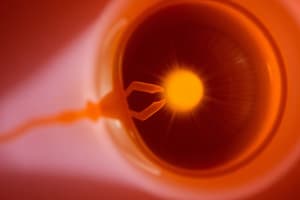Podcast
Questions and Answers
Which embryonic structure gives rise to the optic nerve and optic chiasm?
Which embryonic structure gives rise to the optic nerve and optic chiasm?
- Diencephalon
- Surface ectoderm
- Optic cup
- Optic stalk (correct)
What adult structures are derived from the diencephalon?
What adult structures are derived from the diencephalon?
- Optic nerve and optic tract
- Retina and iris epithelium (correct)
- Lens and cornea
- Sclera and choroid
Which of the following is derived from surface ectoderm?
Which of the following is derived from surface ectoderm?
- Central artery of retina
- Vitreous body
- Ciliary muscle
- Lens (correct)
What embryonic structure develops into the sclera?
What embryonic structure develops into the sclera?
Which structure is NOT derived from the optic cup?
Which structure is NOT derived from the optic cup?
Study Notes
Embryonic Structures and Adult Derivatives
- The diencephalon gives rise to the retina, iris epithelium, dilator and sphincter pupillae muscles of iris, and ciliary body epithelium.
- The optic cup, which originates from neuroectoderm, develops into the retina, iris epithelium, dilator and sphincter pupillae muscles of iris, and ciliary body epithelium.
- The optic stalk, also derived from neuroectoderm, forms the optic nerve (CN II), optic chiasm, and optic tract.
- Surface ectoderm is responsible for the development of the lens, anterior epithelium of cornea, bulbar and palpebral conjunctiva.
- Mesoderm gives rise to the sclera, choroid, stroma of iris, stroma of ciliary body, ciliary muscle, substantia propria of cornea, corneal endothelium, vitreous body, central artery and vein of retina, and extraocular muscles.
Studying That Suits You
Use AI to generate personalized quizzes and flashcards to suit your learning preferences.
Description
This quiz explores the embryonic origins of various eye structures and their adult derivatives. It details the contributions of the diencephalon, optic cup, optic stalk, surface ectoderm, and mesoderm to eye anatomy. Test your knowledge on how these structures develop and their functions in the adult eye.



